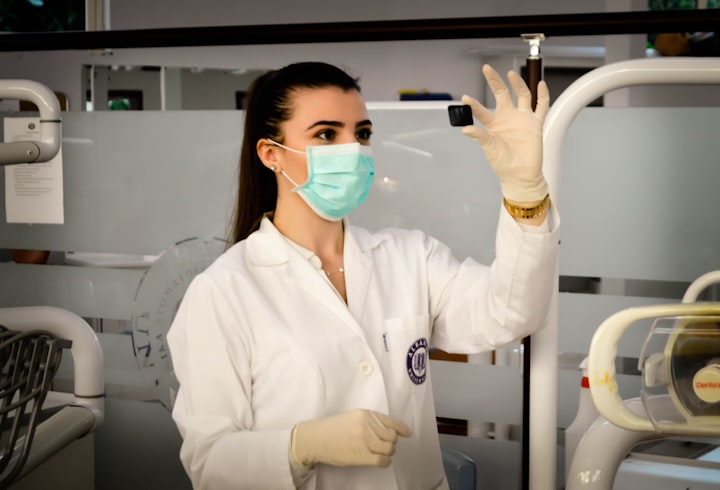The Importance of Optometrist Doctors: Comprehensive Eye Care for Better Vision
Enhancing Visual Health through Expert Optometric Care

Are you experiencing blurry vision, eye strain, or headaches after prolonged computer use? Have you noticed a sudden change in your visual acuity or difficulty in focusing on objects? If yes, then it's time to visit an optometrist doctor. Optometrists are healthcare professionals who specialize in comprehensive eye care, ranging from routine eye exams to the diagnosis and treatment of various eye conditions. In this article, we will discuss the importance of optometrist doctors, their role in maintaining optimal eye health, and how they can help you achieve better vision.
What are Optometrist Doctors?
Optometrists are healthcare professionals who specialize in the diagnosis, treatment, and management of various eye diseases and vision disorders. They are trained to conduct comprehensive eye exams, prescribe corrective lenses or vision therapy, and detect and manage eye conditions such as glaucoma, cataracts, macular degeneration, and diabetic retinopathy. Optometrists are also trained to recognize systemic health conditions such as hypertension and diabetes that can affect the eyes.
The Role of Optometrist Doctors in Eye Care
Optometrist doctors play a crucial role in maintaining optimal eye health. They are equipped with the knowledge and expertise to diagnose and manage various eye conditions and vision disorders. Optometrists conduct comprehensive eye exams to evaluate visual acuity, binocular vision, color vision, and eye health. They can detect early signs of eye diseases such as glaucoma and cataracts, which can lead to vision loss if left untreated.
Optometrists also prescribe corrective lenses or vision therapy to improve visual acuity and manage conditions such as amblyopia (lazy eye) and strabismus (crossed eyes). They can also fit contact lenses and provide recommendations for eye care products and accessories such as eye drops and protective eyewear.
Optometrists work closely with other healthcare professionals such as ophthalmologists, primary care physicians, and opticians to ensure comprehensive and coordinated eye care. They also educate patients on the importance of eye health and provide tips and recommendations for maintaining optimal vision.
Reasons to Visit an Optometrist Doctor
Regular eye exams are essential for maintaining optimal eye health and preventing vision loss. Here are some reasons why you should visit an optometrist doctor:
- Comprehensive Eye Exams:
Comprehensive eye exams are essential for maintaining optimal eye health and preventing vision loss. During a comprehensive eye exam, optometrists evaluate various aspects of vision, including visual acuity, binocular vision, and color vision. They also perform a thorough assessment of eye health, checking for any signs of eye diseases or abnormalities.
One of the primary benefits of a comprehensive eye exam is the early detection of eye diseases such as glaucoma and cataracts. These conditions often develop slowly and without symptoms, making them difficult to detect without an eye exam. However, if left untreated, they can lead to significant vision loss and even blindness.
During a comprehensive eye exam, optometrists also evaluate eye muscle function and coordination, which is essential for comfortable and efficient vision. They can also assess refractive errors such as nearsightedness, farsightedness, and astigmatism and determine the appropriate corrective lens prescription.
Overall, a comprehensive eye exam with an optometrist is a crucial aspect of maintaining optimal eye health. It can help detect early signs of eye diseases and vision problems, leading to prompt treatment and better outcomes. It is recommended to have a comprehensive eye exam every 1-2 years, depending on your age, overall health, and risk factors for eye diseases.
- Vision Correction:
If you are experiencing blurry vision, difficulty focusing on objects, or eye strain, you may have a refractive error that can be corrected with glasses or contact lenses. Optometrist doctors are trained to diagnose and manage various refractive errors such as nearsightedness, farsightedness, and astigmatism.
During a comprehensive eye exam, an optometrist can determine the appropriate corrective lens prescription to improve your visual acuity. They may also recommend contact lenses as an alternative to glasses, depending on your preferences and lifestyle.
In addition to prescribing corrective lenses, optometrists can also provide vision therapy to improve visual function and reduce symptoms such as eye strain and headaches. Vision therapy involves a series of exercises and techniques that are designed to strengthen the eye muscles and improve visual coordination and perception.
Optometrists can also diagnose and manage other vision problems such as amblyopia (lazy eye) and strabismus (eye turn). These conditions often require more specialized treatment, such as patching or eye muscle surgery, which can be performed by an optometrist or referred to a specialist.
If you are experiencing any vision problems or have concerns about your visual acuity, make an appointment with an optometrist today. They can provide the necessary evaluation and treatment to improve your vision and overall eye health.
- Contact Lens Fitting:
Contact lenses are a popular and convenient alternative to glasses for many people. They provide better peripheral vision and a more natural visual experience, especially for those who engage in sports or other physical activities. Optometrists are trained to fit contact lenses and provide recommendations for proper care and maintenance.
During a contact lens fitting, an optometrist will evaluate your eye shape, size, and corneal curvature to determine the best type of contact lens for your needs. They will also consider your lifestyle and preferences when recommending contact lenses, such as daily disposables, monthly lenses, or extended wear lenses.
Optometrists can also provide instructions on proper contact lens care and maintenance, including how to clean and disinfect your lenses, how to insert and remove them safely, and when to replace them. They can also diagnose and manage any contact lens-related problems, such as dry eyes, infections, and allergic reactions.
Regular follow-up appointments with an optometrist are essential for contact lens wearers to ensure the lenses are fitting properly and to monitor any changes in eye health. It is important to follow the optometrist's recommendations for wearing and caring for contact lenses to avoid complications and maintain healthy eyes.
- Diagnosis and Management of Eye Conditions:
Optometrists are primary eye care providers who are trained to diagnose and manage various eye conditions. They can perform comprehensive eye exams to detect early signs of eye diseases such as dry eye syndrome, diabetic retinopathy, and macular degeneration.
Dry eye syndrome is a common condition that occurs when the eyes do not produce enough tears or when the tears evaporate too quickly. Optometrists can diagnose dry eye syndrome and provide treatment options such as artificial tears, prescription medications, and lifestyle changes.
Diabetic retinopathy is a serious complication of diabetes that can cause vision loss if left untreated. Optometrists can perform a dilated eye exam to evaluate the blood vessels in the retina and detect early signs of diabetic retinopathy. They can also provide recommendations for managing blood sugar levels and refer patients to a specialist for further treatment if necessary.
Macular degeneration is a progressive eye disease that can cause central vision loss. Optometrists can diagnose macular degeneration and provide recommendations for managing the condition, such as lifestyle changes and nutritional supplements. They can also monitor the progression of the disease and refer patients to a specialist for further treatment if necessary.
In addition to these conditions, optometrists can diagnose and manage various other eye conditions such as glaucoma, cataracts, and conjunctivitis. They can provide treatment options such as prescription medications, surgical procedures, and lifestyle changes to improve eye health and prevent vision loss.
- Systemic Health Conditions:
In addition to detecting and managing eye conditions, optometrists can also detect systemic health conditions that can affect the eyes. Two of the most common systemic health conditions that optometrists can detect are hypertension and diabetes.
Hypertension, or high blood pressure, can cause damage to the blood vessels in the eyes, leading to vision problems or even vision loss. During a comprehensive eye exam, optometrists can examine the blood vessels in the eyes and detect any signs of hypertension. They can then refer patients to a primary care physician for further evaluation and treatment.
Diabetes is another systemic health condition that can affect the eyes. High blood sugar levels can damage the blood vessels in the retina, leading to a condition called diabetic retinopathy. Optometrists can perform a dilated eye exam to detect early signs of diabetic retinopathy, such as changes in the blood vessels or the presence of fluid in the retina. They can then refer patients to a specialist for further treatment, such as laser therapy or injections.
In addition to hypertension and diabetes, optometrists can also detect other systemic health conditions that can affect the eyes, such as multiple sclerosis, thyroid disease, and autoimmune disorders. By detecting these conditions early on, optometrists can refer patients to the appropriate specialist for further evaluation and treatment, which can improve overall health outcomes.
Overall, optometrists play an important role in detecting and managing both eye conditions and systemic health conditions that can affect the eyes. It is important to schedule regular eye exams with an optometrist to detect and manage these conditions early on and prevent vision loss.
- Children's Eye Care:
Children's eye care is another important area of expertise for optometrists. Vision problems can have a significant impact on a child's development, academic performance, and overall quality of life. Optometrists are trained to detect and manage vision problems in children, including amblyopia and strabismus.
Amblyopia, also known as "lazy eye," is a condition in which one eye is not working as well as the other. This can lead to a reduction in vision in the affected eye if left untreated. Optometrists can detect amblyopia during a comprehensive eye exam and recommend treatment options such as patching or vision therapy to improve the vision in the affected eye.
Strabismus, or crossed eyes, is a condition in which the eyes do not align properly. This can lead to double vision or the brain ignoring input from one eye, leading to amblyopia. Optometrists can detect strabismus during a comprehensive eye exam and refer children to a specialist for further evaluation and treatment, which may include glasses, patching, or surgery.
In addition to detecting and managing amblyopia and strabismus, optometrists can also detect other vision problems in children, such as refractive errors (nearsightedness, farsightedness, and astigmatism) and color vision deficiencies. Early detection and treatment of these vision problems can improve a child's academic performance, social skills, and overall quality of life.
FAQs About Optometrist Doctors
Q. What is the difference between an optometrist and an ophthalmologist?
A. An optometrist is a healthcare professional who specializes in comprehensive eye care, while an ophthalmologist is a medical doctor who specializes in eye surgery and the treatment of complex eye diseases.
Q. How often should I visit an optometrist doctor?
A. It is recommended to have a comprehensive eye exam every 1-2 years, depending on your age, overall health, and risk factors for eye diseases.
Q. Can optometrists prescribe medication?
A. Optometrists in some states have prescribing authority for certain medications such as antibiotics and anti-inflammatory drugs.
Q. What should I expect during a comprehensive eye exam?
A. A comprehensive eye exam typically includes a vision screening, eye muscle and coordination testing, a refraction test to determine your corrective lens prescription, and a dilated eye exam to evaluate eye health.
Q. Can optometrists treat eye infections?
A. Yes, optometrists are trained to diagnose and manage eye infections such as conjunctivitis (pink eye) and styes.
Q. Do I need a referral to see an optometrist?
A. In most cases, you do not need a referral to see an optometrist. However, some insurance plans may require a referral from your primary care physician.
Conclusion:
Optometrist doctors play a crucial role in maintaining optimal eye health and preventing vision loss. They are equipped with the knowledge and expertise to diagnose and manage various eye conditions and vision disorders. Regular eye exams with an optometrist can help detect early signs of eye diseases and vision problems, leading to prompt treatment and better outcomes. If you are experiencing any changes in your vision or have concerns about your eye health, make an appointment with an optometrist doctor today.
Optometrist doctors are healthcare professionals who specialize in comprehensive eye care, ranging from routine eye exams to the diagnosis and treatment of various eye conditions. They play a crucial role in maintaining optimal eye health and preventing vision loss. Regular eye exams with an optometrist can help detect early signs of eye diseases and vision problems, leading to prompt treatment and better outcomes.
About the Creator
abdul jamil
Abdul Jamil: Trusted journalist delivering trending news with accuracy and passion. Stay informed and connected with Abdul Jamil's updates.
If you like the works please a tip or pledge voluntary.






Comments
There are no comments for this story
Be the first to respond and start the conversation.